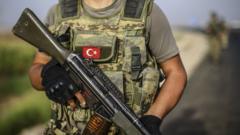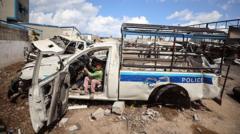**In a notable meeting between Donald Trump and Israeli Prime Minister Benjamin Netanyahu, the US President expressed optimism regarding ceasefire negotiations in Gaza. Trump believes Hamas is open to concluding the ongoing conflict, despite challenges remaining in the discussions.**
**Trump Expresses Optimism for Gaza Ceasefire During Netanyahu Meeting**

**Trump Expresses Optimism for Gaza Ceasefire During Netanyahu Meeting**
US President's remarks follow contentious negotiations as he seeks resolution in prolonged conflict.
Both leaders convened at the White House where Trump remarked that talks aimed at ending the war in Gaza have been progressing positively. Expressing a belief that Hamas is inclined to pursue a ceasefire, Trump stated, "They want to meet and they want to have that ceasefire." These comments come amidst complex negotiations, following a recent round of indirect talks in Qatar that concluded without concrete results but are set to continue later this week.
During the interaction, both leaders faced questions concerning potential relocation plans for Palestinians. Trump noted he has garnered cooperation from neighboring countries but acknowledged strong opposition to relocation from the Palestinian presidency, citing international law. Meanwhile, Netanyahu appeared to temper expectations regarding full Palestinian statehood, asserting that Israel would maintain security oversight over Gaza, regardless of international image.
In a show of confidence, Netanyahu formally nominated Trump for the Nobel Peace Prize, commending his efforts to foster peace in the region. This nomination was presented alongside an accompanying letter to the prize committee.
Despite Trump's previous declarations of being resolute on pursuing peace talks, the gathering was initially set to be private, allowing the leaders to focus on crucial discussions regarding the war and hostage situations without immediate media scrutiny. The US's mediation efforts have surfaced a ceasefire blueprint, proposing that Hamas releases a number of hostages in exchange for concessions from Israel regarding Palestinian prisoners and territory controlled by Israeli forces.
However, significant barriers persist, notably concerning humanitarian aid, which Hamas demands must be guaranteed, a point that Israeli representatives have resisted discussing.
Netanyahu's visit sparked protests outside the White House, where demonstrators advocated for Palestinian rights, brandishing flags and advocating for his arrest amid pending international war crime allegations. The complexity of geopolitics continues to shadow these peace efforts, intertwining local grievances with broad international implications.
With the Gaza conflict now nearing its 22nd month, US involvement has intensified, reflecting a shifting landscape as Trump has indicated a desire to lift sanctions on Iran. The push for a ceasefire, according to White House spokesman Karoline Leavitt, remains a paramount objective for the president as ongoing discussions aim toward achieving lasting resolutions in the region.
During the interaction, both leaders faced questions concerning potential relocation plans for Palestinians. Trump noted he has garnered cooperation from neighboring countries but acknowledged strong opposition to relocation from the Palestinian presidency, citing international law. Meanwhile, Netanyahu appeared to temper expectations regarding full Palestinian statehood, asserting that Israel would maintain security oversight over Gaza, regardless of international image.
In a show of confidence, Netanyahu formally nominated Trump for the Nobel Peace Prize, commending his efforts to foster peace in the region. This nomination was presented alongside an accompanying letter to the prize committee.
Despite Trump's previous declarations of being resolute on pursuing peace talks, the gathering was initially set to be private, allowing the leaders to focus on crucial discussions regarding the war and hostage situations without immediate media scrutiny. The US's mediation efforts have surfaced a ceasefire blueprint, proposing that Hamas releases a number of hostages in exchange for concessions from Israel regarding Palestinian prisoners and territory controlled by Israeli forces.
However, significant barriers persist, notably concerning humanitarian aid, which Hamas demands must be guaranteed, a point that Israeli representatives have resisted discussing.
Netanyahu's visit sparked protests outside the White House, where demonstrators advocated for Palestinian rights, brandishing flags and advocating for his arrest amid pending international war crime allegations. The complexity of geopolitics continues to shadow these peace efforts, intertwining local grievances with broad international implications.
With the Gaza conflict now nearing its 22nd month, US involvement has intensified, reflecting a shifting landscape as Trump has indicated a desire to lift sanctions on Iran. The push for a ceasefire, according to White House spokesman Karoline Leavitt, remains a paramount objective for the president as ongoing discussions aim toward achieving lasting resolutions in the region.


















